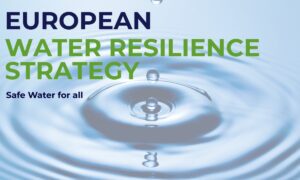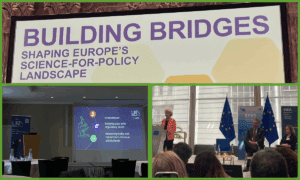The “Science Meets Regions” initiative, ran by the EU’s Joint Research Centre, was focused on supporting projects exemplifying evidence-based policymaking, in line with commission priorities, such as the European Green Deal, the twin (green and digital) transitions, fairness and democracy, and more. Since its informal start in 2016, it can boast of more than 20 projects, such as innovation camps, and events, all achieved through grass-roots approaches. In addition, and important aspect of the project was its pairing schemes: opportunities through which regional policymakers and relevant scientists can meet, build connections and broaden their horizons by gaining insights into their respective areas of expertises.
The two-day closing ceremony – attended by EuChemS Science Communication and Policy Officer Marton Kottmayer – featured plenaries discussing the importance of science-policy collaborations, interactive sessions, the evaluation of the initiative, and a poster session where participants could learn about the successful projects completed within the framework of “Science Meets Regions”. Director-General of the Joint Research Centre Stephen Quest, Stéphane Jacobzone, Senior Advisor for the Organisation for Economic Co-operation and Development (OECD), Teresa Riesgo, General Secretary of Innovation at the Spanish Ministry of Science and Innovation and more were amongst the speakers and panellists of the morning session, followed by two parallel sessions: one about participatory methods, and one about the introduction of a training programme by JRC, for policymakers, to assist them in interpreting scientific evidence. This programme follows an earlier one, also by JRC, that aims to guide scientists with policy interactions. Afternoon sessions allowed participants to engage with the pairing scheme and with citizen science, after which the first day of the event was concluded by a discussion on the future of this initiative. According to its evaluation, the programme has longer-term potential. The following day involved a joint meeting with the European Committee of the Regions’ Knowledge Exchange Platform.



